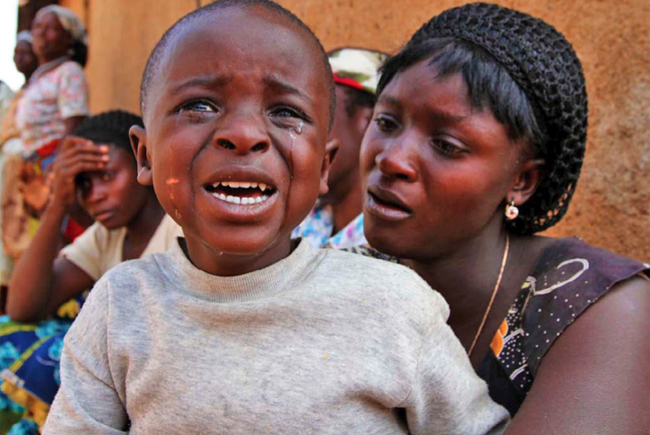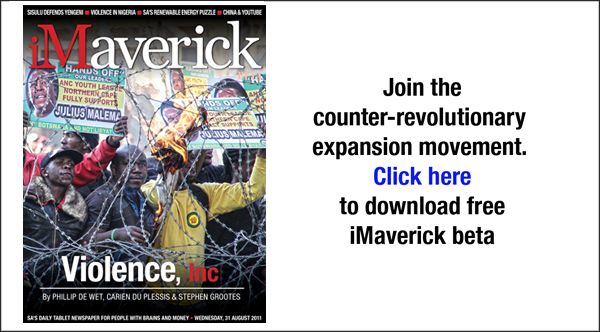Africa
Nigeria’s swift descent into violence

Another day, another bout of sectarian violence in Nigeria. It’s becoming a very dangerous place to be, and President Goodluck Jonathan’s government doesn’t seem to have any solutions. He’d better come up with some quickly. By SIMON ALLISON.
It’s becoming a wearily familiar story. On Monday evening, the troubled city of Jos hosted running battles between Muslim and Christian youths in which 21 people were killed, more than 100 injured and 50 vehicles destroyed. Reports suggest the Muslims were on their way to celebrate the end of Ramadan when they were attacked by Christians looking for revenge for a string of bombs which exploded in Jos on Christmas Eve.
This is the latest in a string of bad-news stories emerging from Nigeria. In the last week alone, there’s been the violence in Jos, the suicide bombing of the United Nations building which killed 21 and an attack on a police station in a northern city which killed 16. And it hasn’t been an atypical week. President Goodluck Jonathan’s government seems to have no answer to the violence, and Nigerians in the affected areas are living in fear.
Most fingers point unequivocally in the direction of Boko Haram, the Islamist militant group looking to impose Sharia law across Nigeria. It has been around for a while, in various incarnations, but it’s been markedly more active in recent months. What’s changed?
There are a few theories doing the rounds. First, the rather sinister proposition that the violence is a political tool, a cynical attempt by aggrieved politicians to prove that Jonathan can’t keep ethnic, religious and regional tensions under control. And Jonathan’s aggrieved plenty of politicians in his unlikely ascent to the top. His presidency, which only came about after previous president Umaru Yar Adua died in office, is a violation of the ruling party’s unwritten rule to alternate the presidency between northerners and southerners, and the northern faction of the PDP isn’t thrilled that Jonathan’s taken its turn. There’s also the main opposition party, the Congress for Progressive Change, whose support comes almost exclusively from the north. It’s not happy because it thinks the last elections were rigged, that it was cheated out of power.
Then there’s the War on Terror theory, as espoused by the US military, which suggests that Boko Haram’s been taking lessons from al-Qaeda in the Islamic Maghreb and Somalia’s Al-Shabaab, and the upsurge in violence is the prelude to al-Qaeda-caused chaos across the African continent. Links between the three groups haven’t been proved, but the bomb at the UN building in Abuja did have more in common with al-Qaeda’s modus operandi than Boko Haram’s traditional operations.
The other theory – probably the most likely – is that Nigeria is volatile at the best of times, and now is not the best of times. Socio-economic factors such as poverty and unemployment make it easy for extremist groups to prosper, especially when they’re fighting against the system and promising a better life for followers. Jonathan’s government, with its legitimacy issues and perceived biases, is also a unifying enemy. Boko Haram’s support, therefore, comes from a sense of marginalisation felt by many Nigerians, which hasn’t been helped by an over-the-top military response.
David Zounmenou, senior researcher at the Institute for Security Studies, told iMaverick the Nigerian government’s response to the crisis was crucial. Military crackdowns aren’t the answer – they’ve been tried in the past, with little success. Nearly 800 Boko Haram fighters were killed by security forces in 2008; this failed miserably to deal with the Boko Haram threat, as evidenced by this latest round of violence. And the amnesty agreement, which went a long way in calming the militancy of the Niger Delta region, will be very difficult to implement because of the shadowy nature of the organisation, which even the Nigerian government knows little about. Zounmenou suggests help must come from elsewhere. “The government thinks it has the capacity to deal with the problem alone, without external partners. But it must seek external help.” International expertise in particular is needed to bolster the Nigerian security forces, which have plenty of experience in dealing with militancy, but not a great record of success.
Whatever the Nigerian government does, it had better do it quickly. Nigeria has never been a unified country. The most difficult job for any of the country’s national politicians is to manage the seething cauldron of regional, religious and ethnic identities which has the potential to burst into flame at any point. Nigeria’s problems – corruption, crime, nepotism, violence – have their roots in the country’s failure to forge an overarching national identity, and politicians’ propensity for exploiting these divisions for their own short-term gain. The longer this current spike in violence continues, the deeper these divisions will become and the more chance there is of other disaffected groups getting involved – which would be a disaster for Africa’s most populous country and its long-suffering citizens. DM
Read more:
- Deadly Christian-Muslim clashes in central Nigeria: witnesses on AFP;
- 20 feared dead, 50 vehicles burnt in fresh Jos violence in Nigeria’s Vanguard.
Photo: REUTERS

















 Become an Insider
Become an Insider